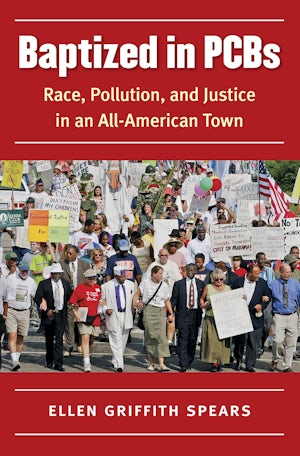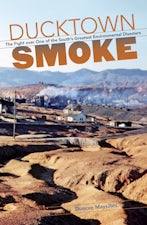Baptized in PCBs
Race, Pollution, and Justice in an All-American Town
By Ellen Griffith Spears
464 pp., 6.125 x 9.25, 37 halftones, 5 maps, notes, bibl., index
-
Paperback ISBN: 978-1-4696-2729-8
Published: February 2016 -
E-book EPUB ISBN: 978-1-4696-1172-3
Published: April 2014 -
E-book PDF ISBN: 979-8-8908-8402-2
Published: April 2014
New Directions in Southern Studies
Buy this Book
- Paperback $40.00
- E-Book $19.99
- Audiobook
For Professors:
Free E-Exam Copies
Awards & distinctions
2015 Francis B. Simkins Award, Southern Historical Association
2015 Reed Environmental Writing Award, Southern Environmental Law Center
2014 Arthur J. Viseltear Award, American Public Health Association Medical Care Section
Spears focuses attention on key figures who shaped Anniston--from Monsanto's founders, to white and African American activists, to the ordinary Anniston residents whose lives and health were deeply affected by the town's military-industrial history and the legacy of racism. Situating the personal struggles and triumphs of Anniston residents within a larger national story of regulatory regimes and legal strategies that have affected toxic towns across America, Spears unflinchingly explores the causes and implications of environmental inequalities, showing how civil rights movement activism undergirded Anniston's campaigns for redemption and justice.
About the Author
Ellen Griffith Spears is associate professor in New College and the Department of American Studies at the University of Alabama.
For more information about Ellen Griffith Spears, visit
the
Author
Page.
Reviews
“A significant and richly detailed study of environmental justice.”--Journal of American History
“Makes a powerful case for considering health and environmental activism as integral components of the long civil rights movement. . . . Scholars will be metabolizing Spears’s observations for years to come.”--The Journal of Southern History
“Exquisitely fulfills sensory history’s potential, advancing concern for the health of natural systems while expressing deep commitment to exposing the historical roots of racial and economic inequality.”--Labour/Le Travail
“A tale of civic redemption.”--Anniston Star
“Spears’ writing is clear and interesting, and she explains the complexities of chemical bonds with the same eloquence that she describes the events that took place in Anniston when Freedom Riders rode through the town in 1961. . . . An excellent addition to the fields of environmental, southern, and Alabama history.”--The Alabama Review
“A well-written and well-documented account of the importance of environmental justice.”--Choice




